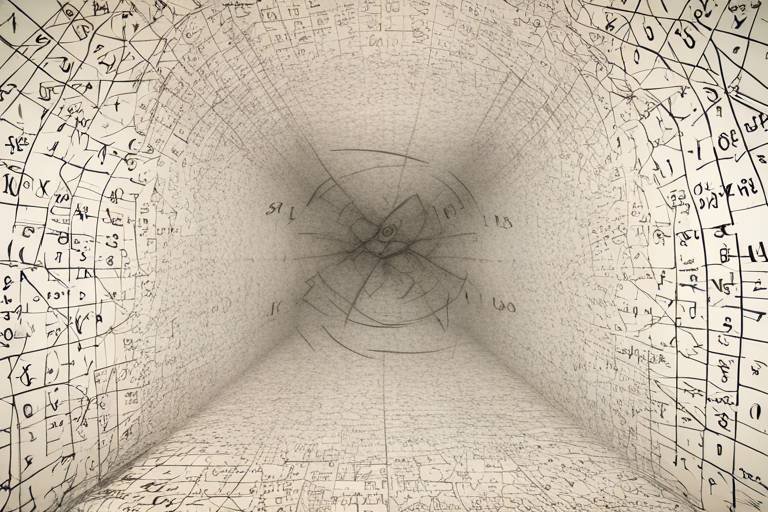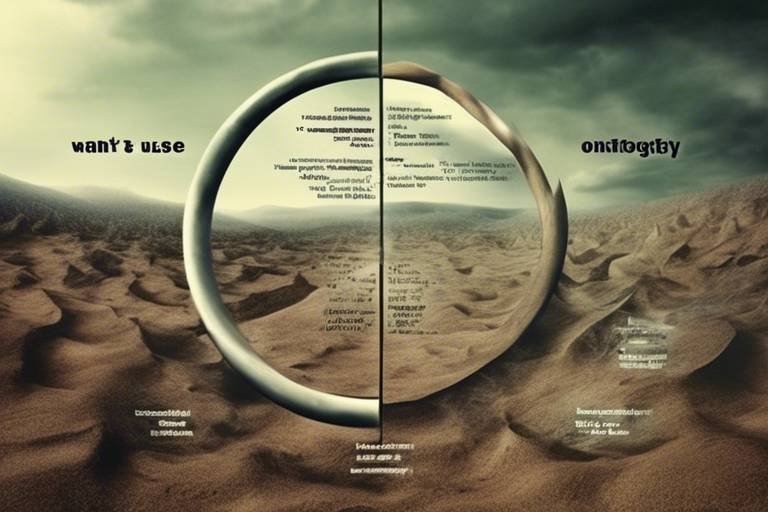Can Metaphysics Prove the Existence of God?
The question of whether metaphysics can prove the existence of God is one that has intrigued philosophers, theologians, and curious minds for centuries. At its core, this inquiry isn't just about faith or belief; it delves deep into the very fabric of reality, existence, and our understanding of the universe. Metaphysics, the branch of philosophy that examines the fundamental nature of reality, provides a unique lens through which we can explore this profound question. It invites us to consider the *big picture*—the reasons behind existence itself and whether there is a divine presence orchestrating it all.
Imagine standing on a beach, staring out at the vast ocean. Each wave that crashes on the shore seems to tell a story, a narrative of existence that goes beyond mere chance. Similarly, metaphysics encourages us to look beyond the surface of our everyday lives and ponder deeper questions. Is everything we see around us merely a product of random events, or is there a greater purpose at play? This is where the intersection of metaphysics and theology becomes particularly fascinating. By examining various metaphysical arguments, we can unveil layers of reasoning that might support the idea of a higher power.
Throughout history, thinkers like Aristotle, Aquinas, and Descartes have contributed significantly to this discourse, each bringing their unique perspectives and arguments to the table. Their works challenge us to think critically about existence and the possibility of God. For instance, the cosmological argument posits that everything that exists must have a cause. This leads us to contemplate the existence of a *first cause*—a foundational entity that initiated everything else, often identified as God. But what does this really mean? It implies that before anything could come into being, there had to be something that was *uncreated*—a necessary being that exists independently of everything else.
Moreover, the dilemma between a first cause and infinite regression is a compelling aspect of this discussion. If we were to accept an infinite chain of causes, we might find ourselves lost in a never-ending loop, where nothing truly begins. On the other hand, accepting a first cause provides a satisfying resolution to the question of existence. It’s like trying to find the source of a river; if we trace it back, we eventually reach a spring—an origin point. This analogy beautifully illustrates how metaphysical thinking can lead us to consider the existence of God as that ultimate source.
In addition to the cosmological argument, the ontological argument presents another intriguing perspective. It asserts that the very concept of God—defined as the greatest conceivable being—necessitates His existence. If we can conceive of a perfect being, then that being must exist in reality because existing in reality is greater than existing only in the mind. This line of reasoning, while abstract, pushes us to confront the nature of existence itself and whether our understanding of God aligns with metaphysical principles.
Furthermore, the teleological argument, often referred to as the argument from design, suggests that the complexity and order we observe in the universe imply a designer. Just as a watch implies a watchmaker, the intricate workings of the universe lead many to conclude that there must be an intelligent force behind it all—again, often identified as God. This argument resonates with many people, as it aligns with our intuitive sense that such beauty and complexity cannot simply arise from chaos.
However, while metaphysical arguments provide compelling insights, they are not without their challenges. The rise of scientific explanations for the universe has introduced significant skepticism regarding metaphysical claims. As we uncover the intricacies of the universe through science, some argue that these discoveries diminish the need for a divine explanation. This tension between science and metaphysics raises critical questions about the nature of evidence and belief, as well as the boundaries of human understanding.
Additionally, various philosophers have presented counterarguments to metaphysical proofs of God, arguing that such reasoning is often speculative and lacks empirical support. These philosophical challenges invite us to engage in a deeper dialogue about the nature of proof and the criteria we use to validate our beliefs. Ultimately, the question of whether metaphysics can prove the existence of God remains a vibrant and ongoing debate, one that continues to inspire exploration and reflection.
- What is metaphysics? - Metaphysics is a branch of philosophy that explores the fundamental nature of reality, existence, and the universe.
- Who are some key philosophers associated with metaphysical arguments for God? - Notable philosophers include Aristotle, Aquinas, and Descartes.
- What is the cosmological argument? - The cosmological argument posits that everything that exists has a cause, leading to the idea of a first cause, often identified as God.
- How does the teleological argument support the existence of God? - The teleological argument suggests that the complexity and order in the universe imply a designer, pointing towards the existence of God.
- What challenges do metaphysical arguments face? - Metaphysical arguments face criticism from scientific perspectives and philosophical counterarguments that question their validity.

The Nature of Metaphysics
Understanding metaphysics is crucial to this discussion. At its core, metaphysics is the branch of philosophy that deals with the fundamental nature of reality, existence, and the universe. It’s like the backstage of a grand play, where the actors (the physical world we see) perform, but the real essence of the story unfolds behind the curtains. Metaphysics asks the big questions: What is being? What does it mean to exist? Is there a reality beyond what we can see and touch? These inquiries provide a framework for exploring theological concepts and the existence of God.
Metaphysics can be broken down into several key areas:
- Ontology: This is the study of being and existence. It explores what entities exist and the nature of their existence.
- Cosmology: This branch examines the origins and structure of the universe, often intersecting with questions about the first cause.
- Philosophy of Mind: This area investigates the nature of the mind, consciousness, and their relationship to the body, often raising questions about free will and determinism.
By delving into these areas, metaphysics serves as a bridge between the physical sciences and the realm of spirituality. It allows us to ponder whether there is a greater purpose or design behind the universe. For instance, when we look at the intricate patterns of nature, from the spirals of galaxies to the delicate structure of a snowflake, we may wonder if these phenomena point to a higher intelligence or a divine creator.
Moreover, metaphysics invites us to consider the implications of existence itself. Why is there something rather than nothing? This question can leave us in a state of awe and wonder, as we grapple with the mysteries of life. It encourages us to explore not just the what of existence but also the why. In this way, metaphysics is not merely an abstract academic pursuit; it is deeply intertwined with our understanding of ourselves and the universe.
In summary, the nature of metaphysics is a profound exploration of reality that challenges us to think beyond the tangible world. It lays the groundwork for philosophical discussions about the existence of God, providing a rich context for the arguments we will explore in the following sections.

Historical Perspectives on God
The quest for understanding God's existence has been a central theme in philosophical discourse for centuries. Thinkers from various backgrounds have contributed to this rich tapestry of thought, each offering unique insights and arguments. To grasp the depth of this discussion, it’s essential to explore the contributions of influential philosophers and theologians who have shaped our understanding of God through metaphysical arguments. From the ancient musings of Aristotle to the profound theological insights of Aquinas and the rational inquiries of Descartes, each perspective provides a piece of the puzzle in the age-old debate about the divine.
Aristotle, often considered the father of Western philosophy, introduced the concept of the "Unmoved Mover." He argued that everything in motion must have been set in motion by something else, leading to the conclusion that there must be a first cause—a being that itself is not caused by anything else. This idea laid the groundwork for later philosophical arguments about God’s existence. Aristotle's Unmoved Mover is not just a static entity; it is a dynamic source of all existence, an idea that resonates through the ages.
Fast forward to the medieval period, and we encounter Thomas Aquinas, who synthesized Aristotelian philosophy with Christian theology. His Five Ways, presented in the "Summa Theologica," provide compelling arguments for the existence of God. Aquinas articulated the cosmological argument in a way that emphasized the necessity of a first cause, which he identified with God. His work bridged the gap between faith and reason, asserting that human intellect could indeed lead to the divine.
Then we have René Descartes, a philosopher who took a different approach. His famous statement, "Cogito, ergo sum" (I think, therefore I am), underscores his belief in the certainty of existence through thought. Descartes proposed the ontological argument, suggesting that the very concept of a perfect being (God) implies existence. If God is the greatest conceivable being, then He must exist; otherwise, He would not be the greatest. This line of reasoning sparked a flurry of debate and further inquiry into the nature of existence and the divine.
Each of these philosophers approached the question of God's existence from a unique angle, yet they all grappled with the same fundamental questions: What is the nature of existence? What does it mean for something to exist? And, crucially, can we prove the existence of God through reason and observation? Their arguments invite us to ponder deeply about the universe and our place within it.
As we explore these historical perspectives, it's clear that the metaphysical arguments surrounding the existence of God are not just academic exercises; they are profound inquiries into the nature of reality itself. They compel us to confront our beliefs and challenge us to think critically about the world around us. The philosophical journey continues, as new thinkers emerge and old arguments are revisited, ensuring that the discourse on God remains vibrant and relevant.
In summary, the historical perspectives on God reveal a rich and complex dialogue that spans centuries. Each philosopher has contributed to a greater understanding of the divine, shaping our beliefs and challenging our perceptions. As we engage with these ideas, we are invited to reflect on our own beliefs and the nature of existence itself.
- What is metaphysics? Metaphysics is a branch of philosophy that explores the fundamental nature of reality, existence, and the universe.
- Who were the key philosophers in the discussion of God's existence? Key figures include Aristotle, Aquinas, and Descartes, each of whom offered unique arguments for the existence of God.
- What is the cosmological argument? The cosmological argument posits that everything that exists has a cause, leading to the conclusion of a first cause, often identified as God.
- How does the ontological argument differ from the cosmological argument? The ontological argument asserts that the very concept of God necessitates His existence, while the cosmological argument focuses on causation.

The Cosmological Argument
The cosmological argument is one of the most compelling philosophical arguments for the existence of God. It begins with a simple yet profound observation: everything that exists has a cause. This leads us to ponder the origins of the universe itself. If we trace back the chain of causation, we inevitably arrive at the question of the very first cause—something that initiated everything without itself being caused. Many philosophers argue that this first cause is what we understand as God.
To illustrate this point, consider a row of dominoes. When you push the first domino, it falls and causes the next one to fall, and so on. Now, imagine if you were to ask: what caused the first domino to fall? If there were no initial push, the entire line would remain standing. This analogy helps us grasp the necessity of a first cause in the cosmos. Without it, we face the perplexing notion of an infinite regression of causes, where each cause requires another cause ad infinitum. This leads to a philosophical dead end, leaving us with the question: can there truly be an infinite series of causes, or must there be a definitive starting point?
Philosophers like Aquinas and Leibniz have contributed significantly to this argument, asserting that the existence of a necessary being—something that must exist and cannot not exist—is essential to explain the existence of contingent beings, which are beings that depend on something else for their existence. In this context, God is viewed as the necessary being that provides the ultimate explanation for the universe's existence.
Here’s a brief overview of how the cosmological argument is structured:
| Premise | Description |
|---|---|
| 1. Everything that exists has a cause. | This premise establishes that nothing comes from nothing. |
| 2. The universe exists. | This is an observable fact that we all agree upon. |
| 3. Therefore, the universe must have a cause. | This leads us to conclude that there is a reason for the universe's existence. |
| 4. This cause is God. | The argument concludes that the first cause is what we identify as God. |
However, the cosmological argument is not without its challenges. Critics often question whether the universe truly requires a cause or if it could exist eternally in some form. Others suggest that the universe itself could be a necessary being. Yet, proponents argue that the concept of a necessary being is fundamentally tied to the idea of God, who is uncaused, eternal, and the ultimate explanation for existence.
In conclusion, the cosmological argument provides a robust framework for discussing the existence of God. By examining the necessity of a first cause, it invites us to reflect on the origins of everything we see around us. It’s a philosophical journey that not only challenges our understanding of existence but also compels us to consider the divine as the ultimate source of all that is.

First Cause vs. Infinite Regression
The debate surrounding the concept of a First Cause versus infinite regression is a cornerstone of metaphysical discussions about the existence of God. At its core, this dilemma asks whether there must be an initial cause that set everything into motion or if we can accept an endless chain of causes stretching back through time. Imagine a set of dominoes lined up in a row; when the first one falls, it causes the next to fall, and so on. If we trace this back, we must ask: what caused the first domino to fall? This is where the argument for a First Cause becomes compelling.
The First Cause argument, often associated with thinkers like Aquinas, posits that everything that exists must have a cause, and if we follow this reasoning back, we must eventually arrive at a cause that is itself uncaused. This uncaused cause is what many identify as God. In contrast, the idea of infinite regression suggests that there is no need for such a First Cause; instead, every effect is merely the result of a preceding cause, creating an endless loop. But does this infinite regression truly satisfy our need for explanation? Many argue that it leaves us with more questions than answers.
To illustrate this, consider the following table that summarizes the key differences between the two perspectives:
| Aspect | First Cause | Infinite Regression |
|---|---|---|
| Definition | An initial cause that is uncaused | An endless series of causes |
| Philosophical Support | Supported by Aquinas, Aristotle | Supported by some modern philosophers |
| Implication for God | Affirms the existence of God | Challenges the necessity of God |
Critics of the First Cause argument often raise concerns about the nature of causality itself. They might argue that if everything needs a cause, then what about God? If God is uncaused, why can't the universe itself be uncaused? This line of questioning leads to a fascinating exploration of the nature of existence and the universe. Is it not possible, they argue, that the universe has always existed in some form? This idea can be both intriguing and perplexing, creating a rich tapestry of thought around the existence of God.
Ultimately, the question of First Cause versus infinite regression is not merely an academic exercise; it touches on our deepest existential questions. Whether one leans towards the necessity of a First Cause or the acceptance of infinite regression, the implications of these beliefs shape our understanding of the universe and our place within it. As we navigate this complex philosophical landscape, we must remain open to the myriad possibilities and the profound mysteries that lie at the heart of existence.
- What is the First Cause argument? The First Cause argument suggests that everything that exists must have a cause, leading to the conclusion that there must be an uncaused cause, often identified as God.
- What is infinite regression? Infinite regression is the idea that every effect has a preceding cause, resulting in an endless chain of causes without a beginning.
- Who are some key philosophers associated with these arguments? Notable figures include Aristotle and Aquinas for the First Cause argument, and various modern philosophers who support the idea of infinite regression.
- Does the First Cause argument prove God's existence? While many see the First Cause as evidence of God, others argue that it does not definitively prove God's existence, as it raises further questions about the nature of causality.

Contingency and Necessity
When we dive into the philosophical waters of contingency and necessity, we are essentially exploring two fundamental categories of existence. Think of it this way: contingency refers to things that could either exist or not exist, depending on various factors or causes. On the other hand, necessity pertains to those entities that must exist, regardless of circumstances. This distinction is crucial in the discourse surrounding the existence of God, as many argue that God embodies a necessary being.
To illustrate this concept, let’s consider the universe itself. Everything we see around us—from the trees swaying in the breeze to the stars twinkling in the night sky—can be viewed as contingent. They rely on various conditions and causes to exist. For instance, a tree exists because of seeds, soil, water, and sunlight. Remove any of these elements, and poof! The tree ceases to exist. In contrast, a necessary being, like God, does not rely on anything outside of itself to exist. God’s existence is self-sufficient and uncaused, making Him fundamentally different from the contingent beings we encounter daily.
Philosophers like Aquinas have posited that if everything in the universe is contingent, then there must be a necessary being that is the source of all existence. This necessary being is what many identify as God. If we were to trace back the chain of causation, we would eventually arrive at this necessary being, which serves as the ultimate explanation for why anything exists at all.
Consider this table that summarizes the differences between contingent and necessary beings:
| Aspect | Contingent Beings | Necessary Beings |
|---|---|---|
| Definition | Existence depends on external factors | Existence is self-sufficient |
| Examples | Plants, animals, humans | God |
| Cause | Requires a cause | Is the uncaused cause |
| Existential Dependency | Dependent on other beings | Independent |
In essence, the argument for God's existence as a necessary being hinges on the premise that if everything were contingent, there would be a gap in the chain of existence. This gap would leave us with a perplexing question: why is there something rather than nothing? The existence of a necessary being provides a satisfying answer to this question, filling in the gaps that contingent beings alone cannot.
However, the discussion does not end here. Critics often challenge the necessity of God by proposing alternative explanations for existence. They argue that perhaps the universe itself is a necessary entity, existing without the need for a divine creator. This brings us to a fascinating crossroads in our exploration of metaphysics and the existence of God, as we must weigh the implications of necessity and contingency against the backdrop of our ever-evolving understanding of reality.
- What is the difference between contingent and necessary beings?
Contingent beings are those whose existence depends on external factors, while necessary beings exist independently and do not rely on anything else to exist. - How does the concept of necessity relate to the existence of God?
The argument posits that if everything in the universe is contingent, there must be a necessary being that is the ultimate cause of existence, often identified as God. - Can the universe itself be considered a necessary being?
This is a point of debate among philosophers. Some argue that the universe could exist necessarily, while others maintain that it requires a necessary being for its existence.

The Ontological Argument
The ontological argument is one of the most fascinating and controversial arguments in the realm of philosophy and theology. At its core, this argument asserts that the very definition of God as the greatest conceivable being implies His existence. In simpler terms, if we can think of a perfect being, then that being must exist in reality because existing is a trait of perfection. Just imagine if you could create the most magnificent, all-powerful being in your mind, and then conclude that this being doesn’t exist. That would be a contradiction, right? This is the essence of the ontological argument, a concept that has sparked intense debate among philosophers for centuries.
One of the earliest proponents of this argument was Saint Anselm, who articulated it in the 11th century. He famously stated, “God is that than which nothing greater can be conceived.” Anselm argued that if God exists only in the mind, then we can conceive of a greater being that exists in reality. Thus, God must exist in reality to be the greatest conceivable being. This line of reasoning opens a Pandora's box of philosophical inquiry, challenging us to think deeply about existence and the nature of perfection.
However, the ontological argument is not without its critics. One of the most notable counterarguments comes from the philosopher Immanuel Kant, who argued that existence is not a predicate or a quality that can enhance the greatness of a being. In other words, just because we can conceive of a perfect being does not mean that such a being exists. This raises an intriguing question: Can we truly equate thought with existence? Kant's critique has led many to reconsider the validity of the ontological argument.
Despite the criticisms, the ontological argument has inspired numerous variations and interpretations. For instance, modern philosophers like Alvin Plantinga have reformulated the argument using modal logic, proposing that if it is possible that a maximally great being exists, then such a being must exist in some possible world. If it exists in some possible world, then it exists in every possible world, including our own. This twist adds a layer of complexity and intrigue to the discussion.
To summarize, the ontological argument is a profound exploration of the relationship between thought, existence, and the divine. It challenges us to ponder the nature of God and our understanding of existence itself. As we navigate through these philosophical waters, we are left with more questions than answers, inviting us to engage in deeper reflection about the existence of God and the nature of reality.
- What is the ontological argument?
The ontological argument posits that the very concept of God as the greatest conceivable being necessitates His existence. - Who first proposed the ontological argument?
The argument was first articulated by Saint Anselm in the 11th century. - What are some criticisms of the ontological argument?
Critics like Immanuel Kant argue that existence is not a predicate that adds to the greatness of a being. - How has the ontological argument evolved?
Modern philosophers like Alvin Plantinga have reformulated the argument using modal logic to defend its validity.

The Teleological Argument
The teleological argument—often referred to as the argument from design—is one of the most compelling metaphysical arguments for the existence of God. It posits that the intricate complexity and order observed in the universe are not mere coincidences but rather the result of deliberate design by an intelligent creator. Just as a watch implies a watchmaker, the universe, with its astonishingly precise laws and harmonious structures, suggests the work of a divine designer. This analogy makes it easy to grasp: if you stumbled upon a watch in the middle of a forest, you wouldn’t assume it came together by chance. Similarly, the universe, with its fine-tuning for life, calls for an explanation beyond random chance.
Supporters of the teleological argument often point to various examples that illustrate this point:
- Fine-Tuning: The constants of nature—like the gravitational constant—are so precisely calibrated that even the slightest deviation would render life impossible. This precision invites the question: is it really plausible that this happened by accident?
- Biological Complexity: The complexity of biological systems, such as the human eye or the intricate processes of cellular functions, exhibits a level of complexity that seems to outstrip the possibility of random evolution alone.
- Order in Nature: The predictable patterns we observe in nature, from the orbits of planets to the cycles of seasons, lend credence to the idea that there is a guiding intelligence behind it all.
Philosophers like William Paley famously articulated this argument in his work "Natural Theology." Paley argued that just as a watch, with its intricate parts working together for a purpose, indicates a watchmaker, the universe's complexity indicates a universe-maker. However, this argument is not without its challenges. Critics often point to the existence of natural processes that can explain complexity without invoking a designer. For instance, evolutionary biology provides a framework through which the complexity of life can be understood without necessarily requiring divine intervention.
Despite these criticisms, the teleological argument continues to provoke thought and discussion. It raises profound questions about the nature of existence and the origins of the universe. Can the beauty and order we see around us be reduced to mere chance, or do they point to something greater? As we ponder these questions, we are invited to consider our place in the cosmos and the possibility of a purposeful creator.
1. What is the teleological argument?
The teleological argument, or the argument from design, suggests that the complexity and order in the universe imply the existence of a designer, often identified as God.
2. Who are some key proponents of the teleological argument?
Notable proponents include William Paley and Thomas Aquinas, both of whom have contributed significantly to the discussion surrounding design in nature.
3. What are some common criticisms of the teleological argument?
Critics argue that natural processes, such as evolution, can explain the complexity observed in the universe without the need for a divine designer. They contend that chance and natural selection can account for the order we see.
4. How does the teleological argument relate to science?
The teleological argument often intersects with scientific inquiry, particularly in discussions about fine-tuning and the origins of life. While some see science as supporting the argument, others view it as providing alternative explanations.

Challenges to Metaphysical Arguments
Despite the rich history and significance of metaphysical arguments in the quest to prove the existence of God, these arguments have not gone unchallenged. In fact, numerous critics have emerged, raising questions that resonate deeply within philosophical and theological circles. One of the primary challenges comes from the realm of science, where empirical evidence and observable phenomena often take precedence over metaphysical speculation. As scientific explanations for the universe continue to evolve, they provide alternative narratives that can undermine traditional metaphysical claims about God's existence.
For instance, the Big Bang theory offers a scientific framework for understanding the origin of the universe, suggesting that it began from a singularity approximately 13.8 billion years ago. This cosmological perspective raises questions about the necessity of a divine first cause. If the universe can be explained through natural processes, does that not diminish the need for a metaphysical explanation? Furthermore, advancements in fields such as quantum physics challenge the deterministic view of causality, introducing concepts that blur the lines between cause and effect, potentially allowing for a universe that exists without a traditional notion of a first cause.
Philosophical counterarguments also play a critical role in the debate. Thinkers like David Hume and Immanuel Kant have posed significant challenges to metaphysical proofs. Hume, for example, questioned the validity of causation itself, arguing that our understanding of cause and effect is based on habit rather than logical necessity. Kant, on the other hand, asserted that human reason is limited and cannot comprehend the nature of the divine or the metaphysical realm. These critiques suggest that metaphysical arguments may be built on shaky foundations, leading to skepticism about their ability to prove God's existence.
Moreover, the rise of atheism and secular humanism has introduced new perspectives that prioritize human experience and rationality over metaphysical claims. Many contemporary thinkers advocate for a worldview grounded in empirical evidence and ethical considerations, rather than reliance on divine authority. This shift poses a significant challenge to the relevance of metaphysical arguments in modern discourse.
In summary, while metaphysical arguments have historically contributed to the discussion around God's existence, they face substantial challenges from both scientific advancements and philosophical critiques. These challenges compel us to reconsider the efficacy of metaphysical reasoning in the contemporary landscape. As we navigate these complexities, the discourse continues to evolve, prompting deeper inquiries into the nature of existence itself.
- What are metaphysical arguments? Metaphysical arguments are philosophical discussions that explore the fundamental nature of reality, existence, and the universe, often used to argue for the existence of God.
- How does science challenge metaphysical arguments? Science provides empirical explanations for natural phenomena, which can diminish the necessity of metaphysical explanations, particularly regarding the origins of the universe.
- What are some key philosophical counterarguments to metaphysical proofs of God? Philosophers like Hume and Kant have questioned the validity of causation and the limits of human reason, suggesting that metaphysical arguments may not be reliable.
- Why is the discussion around God's existence important? The debate about God's existence influences various aspects of human thought, including ethics, purpose, and our understanding of the universe.

Scientific Perspectives
In the grand theater of existence, science often takes center stage, dazzling us with its ability to explain the universe through empirical evidence and observation. But how does this scientific lens interact with the age-old question of God's existence? As we dive into this intriguing intersection, we find ourselves at the crossroads of faith and reason, where metaphysics meets the hard facts of science.
Historically, scientific advancements have provided explanations for phenomena that were once attributed to divine intervention. For instance, the development of the theory of evolution by natural selection offered a compelling narrative for the diversity of life on Earth, challenging the creationist perspective that posits a direct hand of God in the formation of species. This shift not only reshaped our understanding of biology but also ignited debates about the role of a creator in a universe that seems to operate on natural laws.
Moreover, the Big Bang theory, which suggests that the universe originated from a singular, infinitely dense point, raises profound questions about the nature of existence itself. If everything we see around us began with a cosmic explosion, does that imply a first cause, or does it suggest an infinite regression of events? This is where the metaphysical arguments clash with scientific reasoning, as both sides attempt to answer the ultimate question: Why is there something rather than nothing?
Despite the challenges posed by scientific explanations, many argue that science and faith need not be adversaries. Some scientists and theologians propose a harmonious relationship, suggesting that the intricate laws of physics and the fine-tuning of the universe could indeed point towards a designer. They argue that the complexity and order we observe are not merely products of chance but could be indicative of a purposeful creation. This perspective invites us to consider the universe as a beautifully crafted tapestry, woven together with threads of both science and spirituality.
However, skepticism remains prevalent. Critics of theistic interpretations of scientific findings often assert that invoking God as an explanation for the universe's complexity is unnecessary. They argue that science, with its ever-evolving understanding, can provide sufficient answers without the need for divine intervention. This debate often leads to the question of whether science can truly explain everything, or if there are realms of existence that lie beyond its grasp.
To further illustrate this point, consider the following table that summarizes key scientific theories and their implications for the existence of God:
| Scientific Theory | Implication for God's Existence |
|---|---|
| The Big Bang Theory | Suggests a beginning to the universe, raising questions about the cause. |
| The Theory of Evolution | Challenges traditional creationist views, proposing natural selection as a mechanism. |
| Quantum Mechanics | Introduces uncertainty and randomness, leading to questions about determinism and divine control. |
As we ponder these scientific perspectives, we cannot ignore the profound implications they have on our understanding of existence and the divine. The dialogue between science and metaphysics is ongoing, and it invites us to explore deeper questions about our reality. Are we simply products of chance, or is there a greater purpose behind our existence? The answers may not be clear-cut, but the journey of exploration is what keeps the conversation alive.
- Can science and faith coexist? Yes, many believe that science explains the 'how' of the universe while faith addresses the 'why.'
- What is the Big Bang Theory? A scientific explanation for the origin of the universe, suggesting it began from a singular point.
- Does evolution disprove the existence of God? Not necessarily; many view evolution as a tool used by God in the creation process.
- What is the role of metaphysics in this discussion? Metaphysics seeks to explore fundamental questions about existence, often intersecting with theology.

Philosophical Counterarguments
The debate surrounding the existence of God through metaphysical arguments is rich and complex, with many philosophers stepping into the ring to challenge these proofs. One of the most significant counterarguments comes from the realm of skepticism. Skeptics argue that metaphysical arguments often rely on assumptions that are not universally accepted. For instance, the cosmological argument hinges on the idea that everything must have a cause. But, what if the universe itself is uncaused? This notion forces us to rethink the very foundations of causality and existence.
Another prominent counterargument is rooted in the problem of evil. Philosophers like Epicurus have famously questioned how an all-powerful, all-knowing, and all-good God can coexist with the presence of evil in the world. This dilemma suggests that if God exists, then He would not allow unnecessary suffering, yet we observe suffering all around us. This contradiction raises significant doubts about the existence of a benevolent deity and challenges the metaphysical claims that seek to prove His existence.
Moreover, some philosophers argue that metaphysical arguments are too abstract and disconnected from empirical evidence. They contend that relying on metaphysical reasoning to assert the existence of God is akin to trying to catch smoke with your bare hands. David Hume, for instance, was a vocal critic of the teleological argument, suggesting that just because we see order and design in the universe does not necessarily imply a designer. He posited that natural processes could account for the complexity we observe, thus undermining the argument from design.
Additionally, the rise of scientific explanations for the origins of the universe further complicates the metaphysical discourse. With theories like the Big Bang and evolution providing naturalistic explanations for existence and complexity, the need for a divine explanation diminishes in the eyes of many. This shift towards a scientific worldview challenges the relevance of metaphysical arguments, as they often seem to struggle in the face of robust empirical evidence.
Finally, one cannot overlook the diversity of beliefs across cultures and religions. If metaphysical arguments can lead to the existence of God, why do they yield such varying conclusions in different philosophical traditions? This multiplicity suggests that metaphysical reasoning may be more subjective than objective, raising questions about its effectiveness in proving a singular divine existence.
In summary, while metaphysical arguments have their merits, they are not without their challengers. Issues like skepticism, the problem of evil, the rise of scientific explanations, and cultural diversity all contribute to a rich tapestry of philosophical counterarguments that invite us to think critically about the existence of God.
- What is metaphysics? Metaphysics is a branch of philosophy that explores the fundamental nature of reality, existence, and the universe.
- What is the cosmological argument? The cosmological argument posits that everything that exists has a cause, ultimately leading to the conclusion of a first cause, often identified as God.
- What are the main counterarguments to metaphysical proofs of God? Key counterarguments include skepticism about causality, the problem of evil, the rise of scientific explanations, and the diversity of religious beliefs.
- How does the problem of evil challenge the existence of God? The problem of evil questions how an all-good, all-knowing, and all-powerful God can allow suffering and evil in the world.
Frequently Asked Questions
- What is metaphysics?
Metaphysics is a branch of philosophy that explores the fundamental nature of reality, existence, and the universe. It asks big questions like "What is there?" and "What is it like?" By delving into these inquiries, metaphysics provides a framework for discussing concepts such as God and the nature of existence.
- How does the cosmological argument support the existence of God?
The cosmological argument suggests that everything that exists has a cause. This leads to the idea that there must be a first cause, which many identify as God. It's like a domino effect; if you knock over one domino, it causes the next one to fall. Eventually, you need a first domino that started it all, and that's where God comes in!
- What is the difference between contingent and necessary beings?
Contingent beings are those that depend on something else for their existence, while necessary beings exist independently and are not contingent on anything else. In metaphysical discussions, God is often viewed as a necessary being, meaning His existence is essential and not reliant on anything else.
- Can the ontological argument really prove God's existence?
The ontological argument posits that the very concept of God implies His existence. If we can conceive of a perfect being, then that being must exist in reality because existing is a part of perfection. It's a bit like saying if you can imagine the best pizza ever, it must exist somewhere, right?
- What are the main challenges to metaphysical arguments for God's existence?
One major challenge comes from scientific perspectives that provide natural explanations for phenomena traditionally attributed to God. Additionally, various philosophers have raised counterarguments that question the validity and soundness of metaphysical proofs, suggesting that they may not be as robust as they seem.
- How do scientific advancements impact the discourse on God's existence?
Scientific advancements, such as theories about the origins of the universe, challenge metaphysical arguments by offering alternative explanations. For instance, the Big Bang theory provides a scientific narrative for the universe's beginning, which some argue reduces the need for a divine creator.
- Who are some key philosophers that have contributed to the discussion on God's existence?
Notable philosophers like Aristotle, Aquinas, and Descartes have made significant contributions to the discourse on God's existence through metaphysical arguments. Each brought unique perspectives that continue to influence contemporary discussions about the relationship between metaphysics and theology.



















